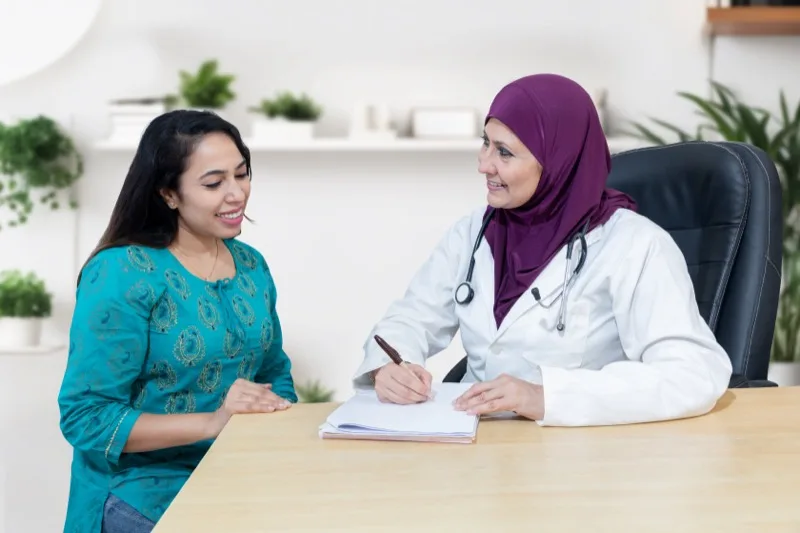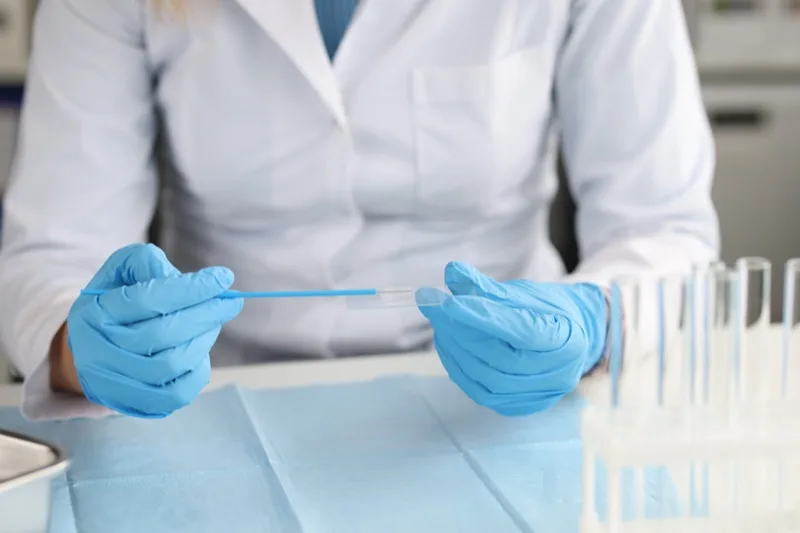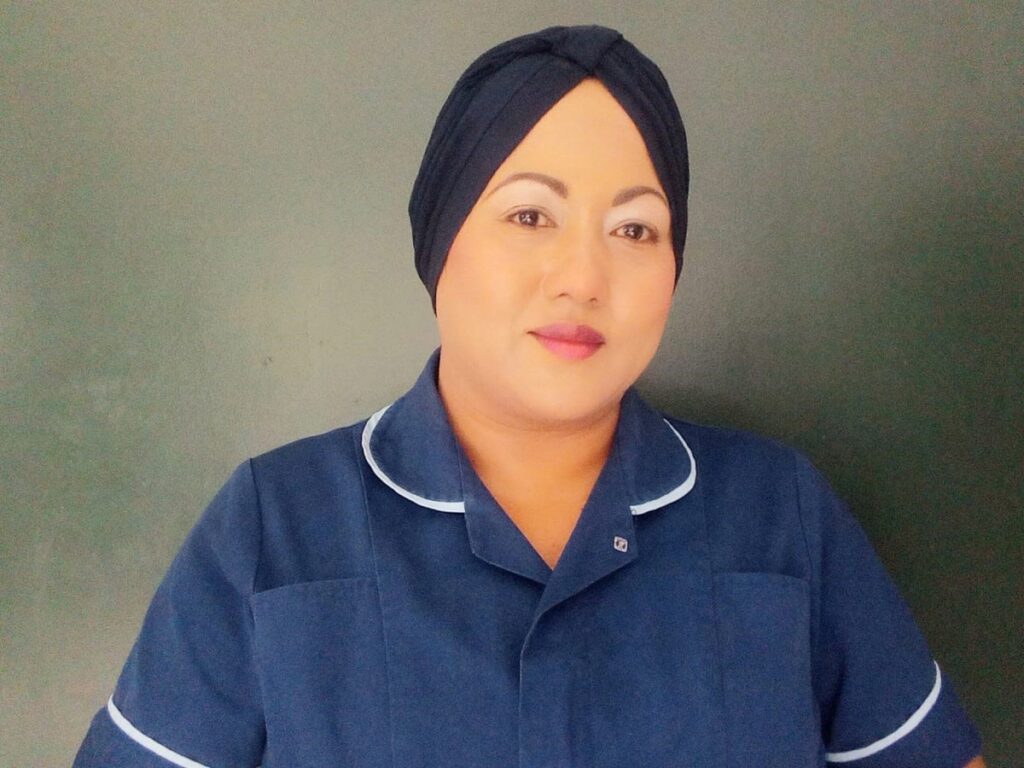
In this two-part series we explore the importance of cervical screening and how vaccination against human papillomavirus (HPV) could eliminate cervical cancer and offer protection against some other cancers linked to HPV too.
Hopefully, you have heard of cervical screening, but do you know how it helps to prevent cervical cancer? In fact, over 3 million women and people with a cervix aged 25 to 64 are screened each year, with the aim of preventing cancer.
During the procedure a small sample of cells are taken from the cervix, which is the opening to the womb, using a small type of brush. This is then checked for a type of virus called HPV. If detected early, effective treatments are available to remove any abnormal cervical cells caused by the high-risk HPV infection, to prevent cancer.
Should I go for cervical screening?

“If you have a cervix, then cervical screening is for you,” says GP, Dr Shehla Imtiaz-Umer. “Please don’t let anything stop you attending. It takes a few minutes and could save your life.”

“There are many reasons you might miss out on cervical screening explains Dr Imtiaz-Umer.
“You could miss your invite if you aren’t registered with a GP surgery or have moved address.
“You might skip it, as you haven’t noticed any cancer symptoms, don’t want to miss work, care for someone else, feel scared or embarrassed.
“You matter to us! Please get screened when you are invited. Some GP surgeries have evening or weekend clinics to help accommodate your working schedules. If you had a bad previous experience, talk to a health professional you trust so we can help make it better next time.”
We are here for you
At the age of 25, Jenna received her first cervical screening. It showed she had HPV, a common infection, along with borderline changes in cervical cells. She says: “This meant it was possible that I would need another test in six months, to ensure there wasn’t anything worrying developing.”
Rukeya Miah, Head of Midwifery in Hull, has previously worked in cervical screening. “The NHS is here for you,” she says.
“We have lots of tips too. For example, you can ask for an appointment with a female clinician. If you find it uncomfortable, you can ask for a different sized speculum, which is a piece of equipment we use during screening to take the sample.
Jenna says about her next cervical screening appointment: “I told the nurse that I was worried because my last test was such a bad experience, and I didn’t know if the HPV was still there.
“The nurse was lovely – she took her time, listened to me, and really went out of her way to look after me.”
“If you have had a traumatic past experience, such as abuse, a difficult pregnancy or just feel scared about it, please ask for help before your appointment, or talk to a charity such as Jo’s Cervical Cancer Trust , the Caribbean and African Health Network (CAHN) or Safeena Muslim Cancer Support.
Your cervical screening results letter

“If high risk HPV is found in your sample, but there wasn’t any evidence of abnormal cell changes, you may need another cervical screening appointment in one year.
“If HPV is found and you have abnormal cell changes, you might need a colposcopy. This is a simple procedure to look at your cervix more closely. A biopsy (small sample) of cells might be taken to test how much change has occurred in your cells.”
Treatment to prevent cancer
Dr Imtiaz-Umer explains “Having high-risk HPV along with cervical cell changes does not necessarily indicate cancer. If a colposcopy is recommended by the medical team, they will discuss it with you to examine the cells in your cervix more closely, as well as consider other tests or treatments to address the altered cells.
Most people will get a results letter that says no further action is needed. Ms Miah explains: “High-risk HPV causes 99% of cervical cancers. If you don’t have high-risk HPV, your risk of cervical cancer is very low and you do not need any further tests. You will be invited for screening again in 3 or 5 years, depending on your age.
After receiving her cervical screening results, Jenna was invited for a colposcopy. She says: “Going for colposcopy can be nerve-wracking and I was really nervous! The team were fantastic and really careful.

“I had two options – have my changed cells removed or, wait six months to see if the cells go back to normal by themselves.
“I decided to have treatment. The team fully explained the potential risks of treatment, but I didn’t want to worry about it developing into cancer.
“Luckily for me the procedure was totally painless.
“At my next colposcopy, everything was clear and now I am back onto regular tests every three years.”
We need to talk about this
Jenna says: “At first, I didn’t want to speak to anyone about my results as I felt like it was a taboo topic. Partly the fear of having cancer and partly because it was not spoken about much at school. My generation did not have the HPV vaccine, and no one really talked to us about sexual health or STIs.
“I’m Arab and mixed race and for me, there was the shame in our culture around sex. It’s often internalised. You don’t really talk to others in the community about sex.
“Finding people who are like you in some way to talk these things through can be really helpful. Someone who understands what you’re going through and can understand why you might be uncomfortable. I also found the Jo’s Trust website really reassuring.”
Head of midwifery Ms Miah adds: “I would urge anyone, no matter what their background, to go for their cervical screening, but also to seek help if they are experiencing any symptoms that they are worried about.”
Eliminating cervical cancer

Jo’s Trust reports that every day in the UK, two women lose their lives to cervical cancer. NHS England has committed to eliminate cervical cancer by 2040.
Dr Imtiaz-Umer says: “Getting vaccinated for HPV and participating in cervical screening are essential steps to help eradicate cervical cancer.
“If you don’t understand any information given to you about cervical screening, please do contact your GP surgery and discuss your concerns with a member of the team. Please also ensure your GP has your accurate address.
“If you’re registered as male but have a cervix, consult your GP practice to help make sure that invitations for both cervical and breast cancer screenings are sent to you. Lastly, as a GP, I want to emphasise that everyone in the UK is welcome to register with a GP.”
More information about the HPV vaccine and NHS screening programmes can be found on www.nhs.uk, or in different languages and easy read formats www.gov.uk/screening and there is also NHS screening information for trans and non-binary people at www.gov.uk.















